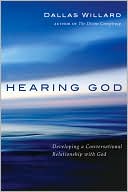

 |

|

The average rating for Hearing God: Developing a Conversational Relationship with God based on 2 reviews is 5 stars.
Review # 1 was written on 2015-03-07 00:00:00 Fabian Garcia Sanchez Fabian Garcia SanchezWe all get nervous when people say "God spoke to me." And sometimes rightfully so. Willard deconstructs both sides of the reaction and gives us a tour-de-force in philosophy as well. While we Evangelicals want to preserve the Bible's integrity and maintain sane spiritualities, we don't want to hyper-react in the opposite direction, and so Willard begins: The goal is not hearing an audible voice from heaven, but cultivating a relationship that rests upon divine guidance. It is a humble dependence and openness upon God. Therefore, Willard's steps to hearing God: We learn to recognize the weight or force of God's voice. A certain spirit And the content (180). And for the most part, Willard does not think God will speak audibly to us (and so cessationists can start breathing again!), and certainly not in a way that will "add to the Bible," whatever that (non)argument means. Rather, we would expect a "still, small voice" (86-116) that speaks in the form of "our own thoughts and perceptions" (Willard 182). But that's pure subjectivism, someone may respond? It is subjective, yes, but not viciously so. All interpersonal communication, even from the Bible, will be subjective. This is so because the thought-word-content passes from one speaking Subject to a receiving Object. The object, if obedient and listening, internalizes the content and in the re-speaking, will act as a new subject. The material has long since been subjectivized. But does subjectivism mean pure relativism? We see no argument from the critic on why this is so. It is asserted loud and strong but rarely argued. But how do you know it's not from Satan? It's a good question and Willard anticipates it. He notes, "We must not also overlook the fact that light only serves as Satan's disguise because God is light, we are children in light and saints in light and God maketh his messengers a flame of fire. It would be strange if we came to shun the genuine just because it resembled the counterfeit" (88). But we can go even further. Just because people are open to God still communicating today, we do not reject the Bible. The Bible's contents can never be contradicted, though the Bible's cultural intentions may certainly be bypassed at times. A Philosophical Feast Just some snippets: ~ Spirit is unbodily, personal force (120). ~~ God invites us into his kingdom, and his kingdom is life (122), a network of personal relationships, and a range of activities and responses (150). *Words shape ontology, and so reality responds (131). **There are degrees of power in speaking a word, and prayer heightens that power (134). ***The Bible is the written word of God, but the word of God is not simply the Bible (142). The "Word" can be: a)eternally set in the heavens (Ps. 119:89). b) the Logoi in the order of nature (Ps. 19:1-4). c) Sown in the ministry of Christ (Mt. 13) d) That which prevailed in Acts (12:24) All of the above is the Word of God, but none of it is equated with the Bible. The "Word of God", then, to borrow a page from Maximus the Confessor, is the systalic/diastatic movement of the Logos/logoi. ****God and the Soul meet in the invisible world because they are both invisible by nature. Legalism, Superstition, and Magick Willard has a very profound section on this point. Magick--the bad kind, not juggling--is the manipulation of symbolisms or special substances like effigies or incantations (137). These are usually impersonal by nature. When you had a spiritual, evil personality to it, you get Satanism. Superstition is belief in magick, but Willard then points out: magick relies on alleged causal influences that are not mediated through nature. If I throw a rock and hit some innocent person, that is a sin, but it's not magick. There is a 1:1 causal relation. If someone sticks needles in a doll, then act of sticking needles doesn't actually produce ill effects. But what of the overwhelming evidence that there are perceived ill-effects? Again, Willard's wisdom: "The effects are produced from the realm of mind or spirit in a social context where a certain set of beliefs about voodoo or magical rituals are shared...The power involved is not the power of the ritual itself. It is the power of personal force...and perhaps the Satanic dimension of the spiritual realm" (138). |
Review # 2 was written on 2013-06-12 00:00:00 Raymond Rodriguez Raymond RodriguezIn honor of Dallas Willard's recent passing, I reread HEARING GOD. Filled with wise counsel and deep reflection, he begins with what should be obvious to all Christians: God wants to have an intimate daily relationship with us, one characterized by conversational communication. We are to expect God to guide, counsel, critique, and comfort us as he shapes us into his son's image. One mystery to me is why more Christian books are not preoccuppied with this very issue. How do we hear God and recognize his voice? Most Christians books either ignore or refute the very idea that God communicates directly to each of us, despite being in a tradition that expects everyone to have a conversion experience where they encounter God. Still, while Dallas Willard never won awards for the quality of his writing, he did earn fame and respect for his quality of thinking, and this book is full of needed wisdom and practical advice on an essential subject for all Christians who want to live a vital and mature Christian life. |
CAN'T FIND WHAT YOU'RE LOOKING FOR? CLICK HERE!!!